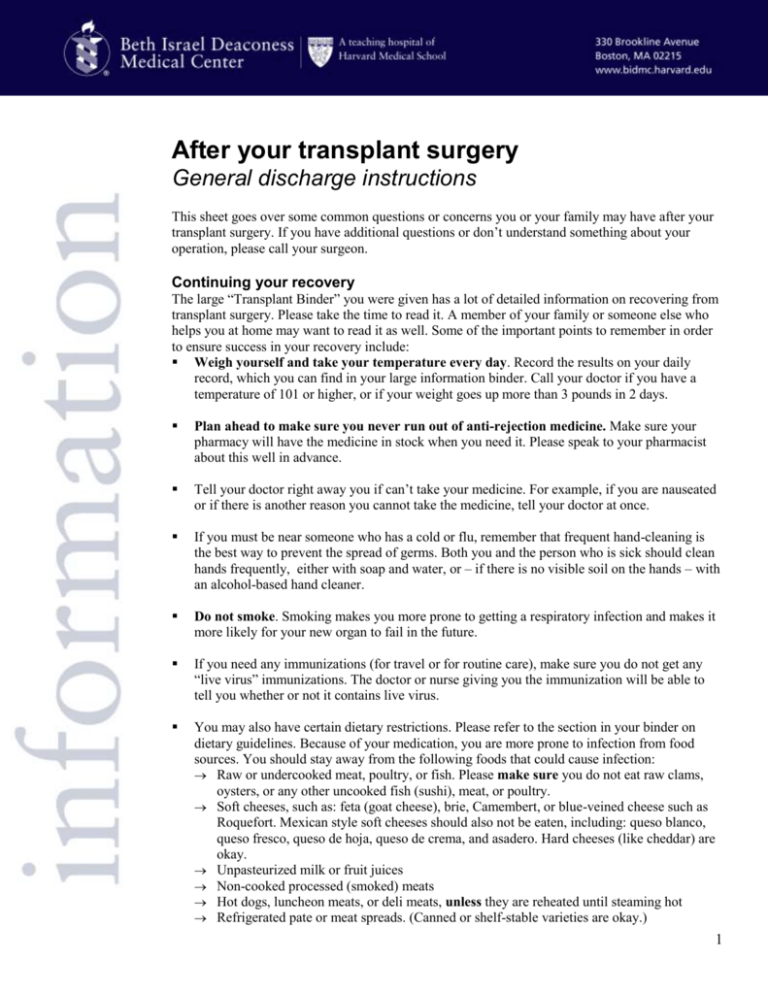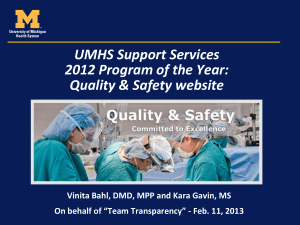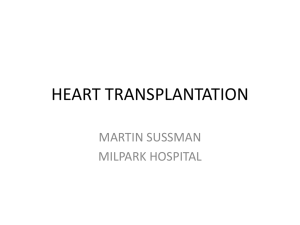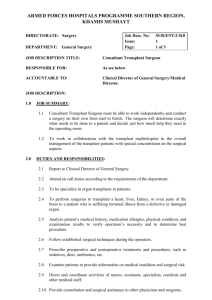
After your transplant surgery
General discharge instructions
This sheet goes over some common questions or concerns you or your family may have after your
transplant surgery. If you have additional questions or don’t understand something about your
operation, please call your surgeon.
Continuing your recovery
The large “Transplant Binder” you were given has a lot of detailed information on recovering from
transplant surgery. Please take the time to read it. A member of your family or someone else who
helps you at home may want to read it as well. Some of the important points to remember in order
to ensure success in your recovery include:
Weigh yourself and take your temperature every day. Record the results on your daily
record, which you can find in your large information binder. Call your doctor if you have a
temperature of 101 or higher, or if your weight goes up more than 3 pounds in 2 days.
Plan ahead to make sure you never run out of anti-rejection medicine. Make sure your
pharmacy will have the medicine in stock when you need it. Please speak to your pharmacist
about this well in advance.
Tell your doctor right away you if can’t take your medicine. For example, if you are nauseated
or if there is another reason you cannot take the medicine, tell your doctor at once.
If you must be near someone who has a cold or flu, remember that frequent hand-cleaning is
the best way to prevent the spread of germs. Both you and the person who is sick should clean
hands frequently, either with soap and water, or – if there is no visible soil on the hands – with
an alcohol-based hand cleaner.
Do not smoke. Smoking makes you more prone to getting a respiratory infection and makes it
more likely for your new organ to fail in the future.
If you need any immunizations (for travel or for routine care), make sure you do not get any
“live virus” immunizations. The doctor or nurse giving you the immunization will be able to
tell you whether or not it contains live virus.
You may also have certain dietary restrictions. Please refer to the section in your binder on
dietary guidelines. Because of your medication, you are more prone to infection from food
sources. You should stay away from the following foods that could cause infection:
Raw or undercooked meat, poultry, or fish. Please make sure you do not eat raw clams,
oysters, or any other uncooked fish (sushi), meat, or poultry.
Soft cheeses, such as: feta (goat cheese), brie, Camembert, or blue-veined cheese such as
Roquefort. Mexican style soft cheeses should also not be eaten, including: queso blanco,
queso fresco, queso de hoja, queso de crema, and asadero. Hard cheeses (like cheddar) are
okay.
Unpasteurized milk or fruit juices
Non-cooked processed (smoked) meats
Hot dogs, luncheon meats, or deli meats, unless they are reheated until steaming hot
Refrigerated pate or meat spreads. (Canned or shelf-stable varieties are okay.)
1
Refrigerated smoked seafood (most often labeled “nova-style,” “lox,” “kippered,”
“smoked,” or “jerky”)
Odwalla juices (they are not pasteurized)
Raw honey
Please wash all fruits and vegetables well before eating. Wash the peels of all fruits and
vegetables, even if you will be peeling before eating. This includes the peels of bananas and
melons.
It’s important that you not drink alcohol. After three months, talk with your doctor about
whether you may have an occasional drink. Some patients need to give up alcohol completely.
Do not eat grapefruits or drink grapefruit juice, as this can affect how some of the
transplant medications work in your body.
Activity
Do not drive until you have stopped taking pain medicine and feel you could respond in an
emergency.
You may climb stairs.
You may go outside. Avoid traveling long distances.
Don’t lift more than 10-15 pounds for 6 weeks. (This is about the weight of a briefcase or a bag
of groceries.) This applies to lifting children, but they may sit on your lap.
You may start some light exercise when you feel comfortable. Refer to the section in your
binder on Activity Guidelines for further information.
In most cases, swimming is OK after 4 to 6 weeks, as long as the incision is completely healed.
Before you swim, please check with your transplant team to make sure it is okay.
Heavy exercise may be started after 6 weeks, but use common sense and go slowly at first.
You may resume sexual activity after 4 weeks.
For anyone, spending a lot of time in the sun can make you more likely to get skin cancer. The
medicines you are on make you more likely to get cancer from the damaging effects of sun
exposure. Avoid spending long periods of time in the sun. When you are in the sun, use
sunscreen at all times. Wear a wide-brimmed hat and long sleeves.
How you may feel
You may feel weak or “washed out” for 6 weeks. You might want to nap often. Simple tasks
may exhaust you.
You may have a sore throat because of a tube that was in your throat during surgery.
You might have trouble concentrating or difficulty sleeping. You might feel depressed.
2
You may find you have a poor appetite or that food doesn’t taste the same. This is related to
your new medications. It will get better in a few weeks.
All these feelings and reactions are normal and should go away in a short time. If they do not,
tell your doctor.
Your incision
Your incision may be slightly red around the stitches or staples. This is normal.
You may gently wash away dried material around your incision.
If you have steri-strips (thin paper strips that might be on your incision), do not remove them
for 2 weeks. But if they fall off before that, it’s okay.
It is normal to feel a firm ridge along the incision. This will go away.
Avoid direct sun exposure to the incision area for 6-12 months.
Do not use any ointments or powder on the incision unless you were told otherwise.
You may see a small amount of clear or light red fluid staining your dressing or clothes. If the
staining is severe, please call the transplant center.
You may shower. No tub baths for at least 4-6 weeks.
Over the next 6-12 months, your incision will fade and become less prominent.
Your bowels
Constipation is a common side effect of medicine such as Percocet or codeine. If needed, you
may take a stool softener (such as Colace, one capsule, once or twice a day) or a gentle laxative
(such as Milk of Magnesia, 1 tablespoon, twice a day). You can get both of these medicines
without a prescription. Do not take any other non-prescription remedy without checking with
your doctor. Please refer to the “Over-the-Counter-Medication-Guide” in your Transplant
Binder.
If you have difficulty or pain moving your bowels, please call the transplant center.
If you get diarrhea, don’t take anti-diarrhea medicines. Drink plenty of fluids. If the diarrhea
does not get better in 1-2 days, please call the transplant team.
Medications
Follow the medicine schedule as outlined on the green medication card you were given in the
hospital. Do not take medicines you used to be on if they are not on your new medicine
schedule. If you are not sure about what medicines to take or not to take, call your transplant
coordinator. You need to be very clear on what medicines to take and when to take them.
You will go home with prescriptions for pain medicine to take by mouth. You may take these if
needed in the first couple of weeks after your surgery for incisional pain.
3
Do not take any over-the-counter (non-prescription) medicine – including vitamins, herbs, and
supplements – without referring to the “Over-the-Counter-Medication-Guide” in your
Transplant Binder. Please call the transplant team if you have questions.
Never stop taking your anti-rejection medicine and never adjust the dose without first speaking
to your transplant coordinator or doctor. If you vomit after taking your pills and do not see any
medication in the vomit, do not repeat your doses. If you see your meds, you can try taking the
pills again. If the vomiting continues, call the transplant center.
Follow-up care
You’ll need to see one of your doctors on a weekly basis for the next 6 weeks. You will
be given your first six weeks of follow-up appointments at the time of discharge. You
will also need to have your labs drawn twice a week for six weeks in this initial posttransplant period.
It is also very important that you receive good, routine health care and that you take
certain precautions when receiving care. Please refer to the important section on Other
Health Care Providers in your Transplant Binder.
The Transplant Center
617-632-9700
Danger signs
Sometimes, complications can occur. Depending on the
type of surgery you’ve had, please watch for the following “danger signs.” If any of these
occur, please call the transplant center right away. Someone is available 24 hours a day, 7
days a week at 617-632-9700. For emergencies, always call 911.
Kidney, liver, or pancreas transplant
Liver transplant
temperature of 101 degrees or higher
severe diarrhea, nausea, stomach cramps or
vomiting
redness, swelling, or pain around the incision
bright red or foul-smelling discharge coming
from the wound
new onset of swelling in your face, hands, or
feet, and/or shortness of breath
flu-like symptoms, such as chills, joint pain,
headache, being very tired
problems with urination, such as pain,
burning or very frequent urination
high blood sugars over 400 (Refer to the
section on diabetes in your Transplant Binder
for more diabetes information.)
productive cough associated with fever or
chills
shortness of breath associated with chest pain
( Call 911)
urine that is dark or the color of tea
light or clay-colored bowel movements
a yellow color in the eyes or skin
tenderness over the liver
Kidney transplant patients
swelling in the hands or face
decreased urine output
tenderness over the kidney
Pancreas transplant patients
any blood sugar reading over 200
tenderness over the pancreas
4
This material was prepared by clinicians from the transplant service at Beth Israel Deaconess Medical Center. It is produced
and distributed by The Beth Israel Deaconess Learning Center. ©2008, Beth Israel Deaconess Medical Center. All rights
reserved. MC0791 Rev. 06/08
5






